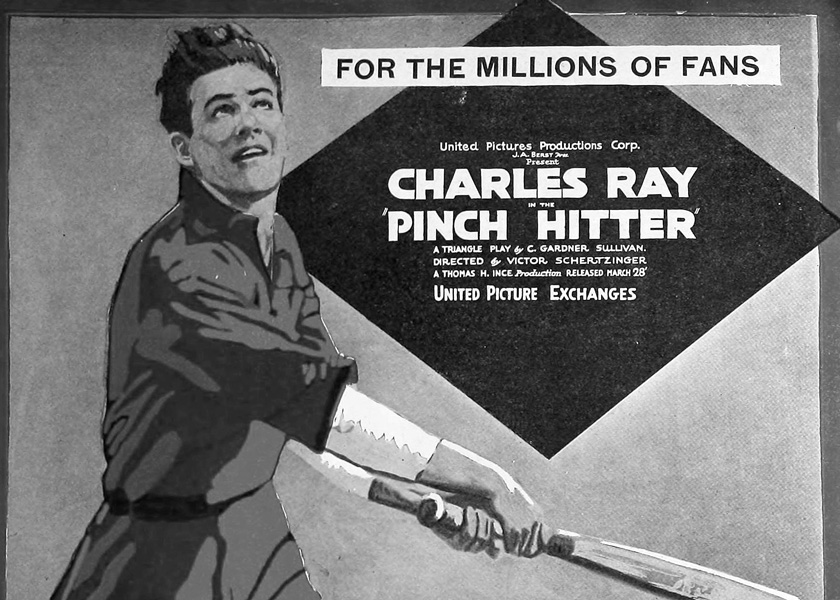Synopsis
Farmboy Joel Parker lives with his father, Obediah. Obediah regards Joel as lazy, stupid, and nearly worthless. Joel has heard this opinion for so long that he is starting to believe it himself. His self esteem is only sustained by the memory of his mother’s love and faith in him. Joel receives an acceptance letter from college. His father is willing to pay for his tuition and food but refuses to give him spending money on the grounds that he will not use it properly. Joel is happy to go to college. A picture of his smiling mother shores up his confidence.
Joel arrives at college in a poorly fitted suit and a too small hat, carrying a picnic basket-like suitcase. The college boys, led by teasing Jimmie Slater, laugh and make jokes about him. In a cafe, Joel meets a friendly young waitress, Abbie Nettleton, who berates the guys for their poor treatment of the new student.
Two weeks later Joel is in love. He has no pocket money and, consequently, is regarded as a tightwad. He goes to the cafe to talk to Abbie, and is the butt of jokes about his cheapness. In the street, he finds a quarter and goes back to ask Abbie to share ice cream with him. The guys follow and sit down at Joel’s table and order ice cream. Leaving, they tell the waitress that Joel will pay. The charge is a dollar. He does not know what to do. Abbie slips some money in his pocket. Joel finds it and pays, but he is embarressed.
Joel invites Abbie to the college dance. When she arrives, a senior reprimands Joel for bringing a waitress to the dance. She runs out crying. Joel follows, but she will not talk to him.
The guys who hang around the cafe are incensed on Abbie’s behalf and throw the senior into the water.Joel decides to leave school and tries to sneak away. Abbie, seeing him, calls him a coward and insists that he stay and learn self confidence. He stays.
Joel tries out for the baseball team. Once again, he is a the butt of jokes, especially when he has trouble fielding the ball. However, the coaches decide that the comical young man will make a good mascot. Joel’s father receives Joel’s picture in his uniform. He proudly shows it off to the neighbors. The day of the big game, Abbie and Obediah are in the stands. They learn that Joel is only the mascot. Obediah is not surprised.
Thompson, the team’s best player, is injured and leaves the game. In the bottom of the ninth, the team is behind by a run. With a man on third and two out Coach Nolan wants Thompson to hit, but he cannot grip the bat. The coach has used all his other players and, in desperation, sends Joel out to hit. After getting a count of three balls and two strikes, Joel hits the ball over the fence. His home run wins the game. Excited, players and students carry Joel off the field.
That evening at the celebration, Joel looks for Abbie, but she has not come. He goes to get her. Joyfully, he proclaims his love. They embrace.
Discussion
This modest film stars Charles Ray, a popular actor of the early feature film period (1915-1920). Ray often played an innocent country boy. Flashy, self confident young men overlooked, mocked and denigrated Ray’s poorly dressed, awkward. and self-effacing youngster. Viewers reacted strongly and sympathetically to Ray’s sensitive and poignant responses to this mistreatment.
Ray was well regarded by film critics of the time, who frequently named him one of the best actors on the screen. Wid Gunning, whose magazine provided reviews and commentary intended for film exhibitors, describes The Pinch Hitter as old stuff, but a well-handled human comedy that will be a sure hit anywhere. Ray’s characterization is “delightfully human,” comic and pathetic. “Charles Ray stands alone as the most successful young man doing this sort of character portrayal.” Ray received essentially this same review in the Motion Picture World, “very human, funny yet pitiful, clever character portrayal,” and in Variety, “good comedy, delightfully played by Charles Ray”.
Director Victor Schertzinger had trained as a violinist and symphony conductor. He played in and conducted several orchestras before becoming the conductor of the Belasco Theater orchestra in Hollywood. In 1915, The Thomas Ince Corp hired Schertzinger to write music to accompany Civilization, Thomas Ince’s epic antiwar film. After this assignment, Schertzinger remained with the Ince company as a composer and arranger.
In 1917, Ince advanced Schertzinger to the additional position of film director. The Pinch Hitter was the first film Schertzinger directed. He followed this film with The Clodhopper (1917), also starring Charles Ray. These films were box office hits, and Schertzinger became Ray’s regular director for the next two years. Schertzinger directed Ray in 14 films.
After his final film with Ray, Schertzinger continued as a director and composer through the 1920s. He made a successful transition to talkies. He directed many musicals, often composing the songs. His best known musicals are One Night of Love (1934) starring Grace Moore, and the Bing Crosby - Bob Hope musical-comedies Road to Singapore (1941) and Road to Zanzibar (1941). Schertzinger had nearly finished the musical-comedy The Fleet’s In (1942), starring Dorothy Lamour and William Holden, when he died suddenly at age 53.
Further Reading

